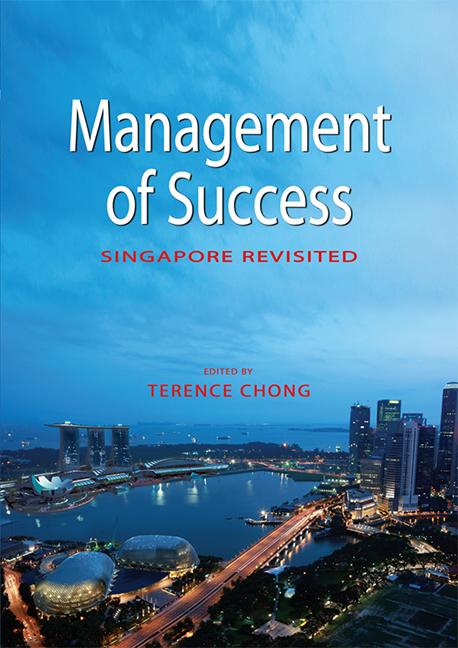Book contents
- Frontmatter
- Contents
- List of Tables and Figures
- Foreword
- Message
- Quote
- Preface
- The Contributors
- 1 Introduction: The Role of Success in Singapore's National Identity
- SECTION 1 SINGAPORE IN THE BIGGER PICTURE
- SECTION 2 LEADERSHIP, POLICY AND POLITICS
- SECTION 3 THE RESTRUCTURING OF THE ECONOMY
- SECTION 4 THE TRANSFORMATION OF SOCIETY
- SECTION 5 THE LAW
- SECTION 6 MODIFICATION OF THE ENVIRONMENT
- SECTION 7 COMMUNITY AND NATIONAL SECURITY
- SECTION 8 LIFE IN SINGAPORE
- 26 Culture, the Arts and the Global City
- 27 Fluid Nation: The Perpetual “Renovation” of Nation and National Identities in Singapore
- 28 Suffer the Rebellious Children: The Politics of Remaking Singapore and the Remaking of Singapore Politics
- 29 “It's Like Rice on the Table, It's Our Common Dish”: The English Language and Identity in Singapore
- 30 Multiculturalism and the Problem of Solidarity
- 31 Sexual Governance and the Politics of Sex in Singapore
- 32 Conclusion
- Index
26 - Culture, the Arts and the Global City
from SECTION 8 - LIFE IN SINGAPORE
Published online by Cambridge University Press: 21 October 2015
- Frontmatter
- Contents
- List of Tables and Figures
- Foreword
- Message
- Quote
- Preface
- The Contributors
- 1 Introduction: The Role of Success in Singapore's National Identity
- SECTION 1 SINGAPORE IN THE BIGGER PICTURE
- SECTION 2 LEADERSHIP, POLICY AND POLITICS
- SECTION 3 THE RESTRUCTURING OF THE ECONOMY
- SECTION 4 THE TRANSFORMATION OF SOCIETY
- SECTION 5 THE LAW
- SECTION 6 MODIFICATION OF THE ENVIRONMENT
- SECTION 7 COMMUNITY AND NATIONAL SECURITY
- SECTION 8 LIFE IN SINGAPORE
- 26 Culture, the Arts and the Global City
- 27 Fluid Nation: The Perpetual “Renovation” of Nation and National Identities in Singapore
- 28 Suffer the Rebellious Children: The Politics of Remaking Singapore and the Remaking of Singapore Politics
- 29 “It's Like Rice on the Table, It's Our Common Dish”: The English Language and Identity in Singapore
- 30 Multiculturalism and the Problem of Solidarity
- 31 Sexual Governance and the Politics of Sex in Singapore
- 32 Conclusion
- Index
Summary
Although [cultural and media] policy guidance has helped to spur institutional reform, the legacy of authoritarianism engenders a cautious approach to industry restructuring and complacency among audiences and the creative community. MediaCorp has the institutional capacity to produce prodigious amounts of programming, but whether it has the creative culture to make it a successful regional producer remains an open question.
— Michael CurtinSingapore, with a population of about 5 million, including foreigners, is a distinct society which perhaps more than other postcolonial societies, in its pursuit of economic growth and development, forsook not only many of the political dimensions of democratic life but also its cultural dimensions, taken in both the “high culture” and “way-of-life” senses. An industrial and commercial understanding of culture was left, and manufacturing and productive institutions became the collective basis of social life. And yet, it was this economic growth and the eventual expansion of the middle class that led to a flourish of experimental theatre and visual art in the 1980s as an increasingly educated citizenry began to ponder larger questions of national culture and national identity.
These cultural and artistic developments, as well as the subsequent cultural policies of the People's Action Party (PAP) state, soon caught the attention of the international media. The 19 July 1999 issue of TIME asked on its cover: “Singapore swings: Can Asia's nanny state give up its authoritarian ways?” The magazine said, “Culturally, Singapore is permitting artists to stage a range of socially and politically controversial performances.” The year 1990 saw the naming of Goh Chok Tong as Lee Kuan Yew's replacement as Prime Minister. This soon led to a formulation of cultural policy by the government. The National Arts Council (NAC) was set up in 1991 under the then Ministry of Information and the Arts (MITA), a ministry that had — in TIME's inimical, overwritten literary style — “PAP intellectual-in-waiting [George] Yeo in charge. The new minister enthused about fostering a global renaissance city, about making Singaporeans more creative, about forging a civic society …”
It is understood in the city-state, though, that the government has not simply gone humanistically soft. In order to be a “creative economy” and a “happening” global city that can retain the “best” foreign and local business and industrial talent, Singapore cannot now display only a philistine modernity.
- Type
- Chapter
- Information
- Management of SuccessSingapore Revisited, pp. 489 - 503Publisher: ISEAS–Yusof Ishak InstitutePrint publication year: 2010



